August 19, 2007
BarCampBlock: Social Network Portability
Led by: Tantek Çelik
why do i have to re-add all of my profile information, re-add friends, etc.?
what about change jobs? move?
base on assumption that user owns their own data - should be able to display profile information anywhere - need open standard to do this
need:
- profile info - vCard (rfc2426), hCard is the same thing, but on the web; doesn't do arbitrary key/value pairs, has 80/20 sweet spot of information; already social sites that, today, are publishing your info as hCard.
- friend list - no good standard
- Blog roles is a good analog
- XFN - add rel="friend", supported part of HREF; can do asymmetrical relationships
- Blog roles is a good analog
Satisfaction - they will import hCard information from other sites when you want to create a new account
Right model is to subscribe to hCard - just poll it, no special protcoal (like RSS) needed. Incombent on consumer to figure out the diff.
hCard only handles public information
OpenID - could be used to try export personal information. Give permission to 3rd party site to access OpenID. Uses website URL to prove that you are who you say you are.
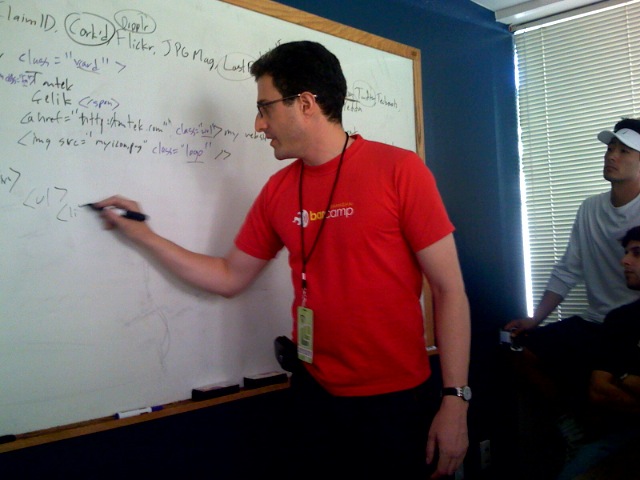
Tantek Celik talking about social network portabilty.
XFN (xhtml friends network) - renders in a browser, but FOAF doesn't - FOAF is somewhat fuzzy as a standard
- It is HTML, just ad some extra elements to existing tags
- simple to understand
- supports differnent granularity for contacts - persion in your XFN list can be a contact, acquaintence, friend, family, etc. - will need import UIs that understand this and give this richness (only import family, etc)
- gmpg.org/xfn - homepage for XFN
can combine hCard and XFN - sprinkle in hCard information into XFN data. Add very little code to make it work. Sites like Cork'd, Dopplr (will import social network), LastFM, and Twitter already support this.
By default, always exporting - the page is the API, is the export.
If you change your URL, you can totally disconnect from your social network. could be bad, or could be what you want.
Identity consolidation - use rel="me" in XFN, to essentially denote that you are friending yourself - or yourself on another site
- need to do bidirection claim in order to verify that it really is the same person
- tantek.com claims twitter.com/t, and twitter.com/t claims tantek.com. Can know that Tantek owns both URLs.
Want vendors to compete to be more open.
ClaimID - identity, also do microID (hash of e-mail address).
Do simple things, evolve simple stanards, make building blocks (the UNIX way), add more complex feature if needed.
Doing this stuff, hCard and XFN, puts you on the open social web.
Technorati Tags: BarCamp, BarCampBlock, XFN, hCard, Social Software
BarCampBlock: Mobile Social Software
It seems like whenever you have a talk about mobile software, it devolves into converstation about everything that is wrong with the space (constrictive nature of the carriers, all phones have different properties, hard to develop for, hard to get users to adopt things, etc.). But, I thought that we got to some interesting points in this conversation, about mobile applications that can work today. You have to think simpler, and base things on SMS and WAP. Everybody wants to do cool things with location-based services and whatnot, but the technology just isn't there yet.
My notes follow.
led by: jordy, social games at digital chocolate, bebo.com
skyhook - company in boston, makes a firefox extension (loki) - senses nearby wifi networks, tries to triangulate your location based upon SSIDs that it can see (they built a DB that maps SSID to location)
standards in mobile
- WAP is pretty much a standard
- SMS is finally a standard (as of like 2 years ago)
if you get embedded on the phone - you're golden. People don't download java apps to phone (too hard, poor experience, etc)
barriers to entry
- downloadable apps - have to do engineering per phone
- barriers on cost side - costs money sms (e-mail to sms gateway works for hackers)
- distribution - have to find ways to get people to find your app
- usability - if it isn't sms or wap, people probably won't figure it out and use it
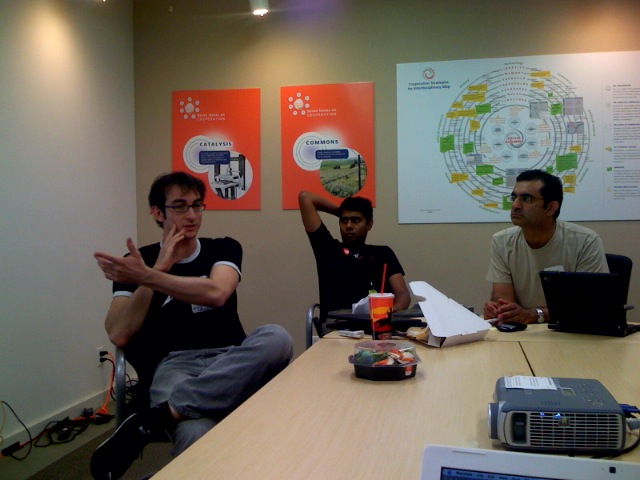
admob - mobile ads, works in wap browser; can target ads per country, operator, handset, etc.
- any hacker dude can add admob to their mobile site
- also, can buy ads, to help distribution
wurfl - open source mobile device db
Papers and other sources:
- social network graph - brad fitzpatrick - apparently, Brad gave a talk on this on the first day of BarCampBlock, that everybody was talking about.
- social network aggregator - bunch of startups in this area, can find via mashable.com
twitter is another great example of what can work in mobile - so stupid simple, which is key to their success
mobilemonday.net - tracks mobile industry news, has pointers to lots of other good stuff
BarCampBlock: Open Source Virtualization
Talk by - Erich Nachbar
CarrierIQ - OpenVZ virtualization
case for virtualization - make servers that are idle do useful work. more about efficiency per unit of space/watt
types of virtualization
- hardware emulation - parallels, vmware - can run any OS unmodified. Cons are that it is hard to manage, performance hit (especially with system calls), static resource allocation (vmware can sortof get around this), density is low (# of VMs per server)
- para-virtualization - run multiple kernels (XEN 2 - bundled with RH5, UML).
- Typically better performance (cuts out some layers of translation)
- cons: requires modification of guest OS, static resource allocation
- Typically better performance (cuts out some layers of translation)
- OS level virtualization - run only one kernel
- Native performance, dynmaic resource allocation, cheap fast (can make new virtual instance in seconds), much easier to manage.
- con: same kernel per virtual server, no mix of operating systems on one server
- examples: OpenVZ (stable, works well), Virtuozo, FreeBSD jails, Linux-Vserver, Solaris Zones
- Native performance, dynmaic resource allocation, cheap fast (can make new virtual instance in seconds), much easier to manage.
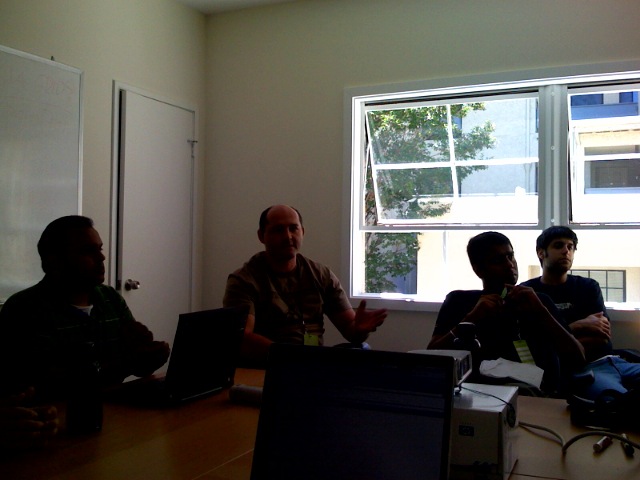
Erich talking about OpenVZ
XEN isn't ready for prime time (not production grade - stability issues?)
OpenVZ has templates - for different distros
OpenVZ is basically Solaris Zones, but open source, and works entirely on Linux. Install procedure on CentOS requires a new kernel (because they have lots of patches to virtualize certain things in the kernel), and some tools RPMs.
BarCampBlock: Worldwide Lexicon
I'm at BarCampBlock in Palo Alto today, and the second talk that I went to was about a new OSS-driven service, Worldwide Lexicon.
Worldwide Lexicon - user contributed language translations of Internet content
- produce tools that webservice providers and publishers can use to produce websites in multiple languages
- like wikipedia - users produce translation
- popular sites will have bilingual users in their population - low percentage in US, much higher in the rest of the world
- want to make system accessible to wide range of websites - via plugins for popular CMS systems, etc.
- add links to blog posts - to translate it to different languages. Look at IP/browser preferences to suggest a language.
- click on edit - brings up an editor that floats on top of the text, for editing the translation.
- Have Wordpress and generic PHP, coming with Movable Type, and possibly Drupal. It is an open source project, so it is possible to easily add support for other platforms.
Brian McConnell, talking about Worldwide Lexicon at BarCampBlock
http://marx.worldwidelexicon.org - more of an admin site
- powered by PHP and cake
- working on a commercial system that'll be out later this year - publishers will be able to list what translation they want done, and list a price (i.e. $.50/paragraph), then it will be up to translator to decide if they want to accept
- governments (particularly EU) might be interested in using this for translation.
- Could extend this framework to translate UI of website, not just content.
user motivations - people who want to keep their language skills up, people who want to share text with friends/family that don't speak the source language, etc.
copyright issues
- translation is a derivative work, translator doesn't have any rights - copyright goes to original author?
- can do it so that they don't steal page views - route all traffic to translate articles through original publishers site.
Education applications
- there are a lot of ways to use this for teachers and students
- could have students do translations of content for assignments - makes it more relevant to them, etc.
http://twitter.pbwiki.com/Clones - shows how there is a market for translated applications.
- People want to be able to see a UI in their own language, and with local idomatic expressions, etc.
Technorati Tags: BarCampBlock, BarCamp, Worldwide Lexicon, Wiki, Translation
June 29, 2006
Barcamp: Wrap-up
I have been busy this week with work and such, and haven't had a chance to sit down and writeup a postscript for last weekend's Barcamp. Thankfully, Justin has prodded me through e-mail, so here it is. Justin writes:
"Any final thoughts on BarCamp? Were there things that you thought they did particularly well? Anything they should have done better?"
And here is my response:
I probably should blog about this, but I think that BarCamp might have been a little over-hyped in my mind. I expected to be fully blown-away by all of the smart people talking about really smart things. Instead, there were a few sessions that were like that, and bunch that were just "ok".Things that they did well - for being an event that is supposed to be barely-contained anarchy, things were planned really well, there was tons of food (which was all very good), and there wasn't really a time where I didn't know what to do. It also seems like they were pretty good about casting the sessions on the 'net (with video, irc, etc.).
Things that weren't as good -- I don't think that we (the participants, myself included) did a good enough job capturing things in the wiki.
All-in-all, it was a weekend well spent, and I would like to go again. I'm pretty happy that so many people volunteered to pull-off Barcamp, because it really was great. I think that if I do go again, I need to work harder on doing a session of my own. By the time I finally decided what I would like to talk about, it was too late. I think it is true that you get out of Barcamp what you put into it, and I was a bit timid this time, and need to put more into it next time.
Justin is also aiming for me to head up to Seattle for Mind Camp, which is also a possibility.
-Andy.
Technorati Tags: Barcamp
June 25, 2006
Barcamp: "Getting Real" in the real world
I went to an interesting session that was basically a discussion of 37signals' PDF book, "Getting Real", and how people are adopting it at their companies. What was interesting to me is that the methodology described in "Getting Real" really does seem to work, especially at smaller, more close-knit companies.
One of the central questions is will this scale, to much larger companies? I related my own experience at EDS (a 117,000 person company -- the next largest company of those that were in the session was 60 people). In my view, there is a pretty real chance at getting my immediate team to adopt some of the principals contained in "Getting Real". My concern, however, is how do teams that are following the agile/getting real approach interact with teams following more "traditional" approaches. This matters, because our team is increasing its interactions with other teams within EDS, and I think this is starting to bring us down to a lowest-common denominator.
The great insight about "Getting Real" that I gleaned, however, was this quote: "the magic of getting real is agile development for the rest of the company (not just the developers)". So, I can definitely see how sending this around to the non-development layers of EDS could really help.
The book seems to be really focused on companies producing web applications, however, which I wish we had addressed in our session. But I still got a lot of food for thought, in my efforts to transform EDS into a more social company.
-Andy.
Technorati Tags: Barcamp, EDS, 37signals, Getting Real
Barcamp: Macromedia (Adobe) Flex & being a Mac snob
Ben Stucki was kind enough to give a talk this morning about Adobe Flex, which is a new development framework that sits on top of Flash 9. However, he had some technical difficulties getting his Sony Vaio to work with the projector, so I decided to step in and show off how easy it is to get my Macintosh to work with external displays. So, sure enough, my Mac detected the projector just fine. But I didn't want to take the time to install the Flash 9 beta, along with the Flex designer (which is based on Eclipse) on my Mac. Instead, I demonstrated how flexible the Macintosh is, by using the Microsoft Remote Desktop client to connect to Ben's Vaio over the WiFi.
So witness Ben giving his presentation on my Mac, connected remotely to his Vaio:
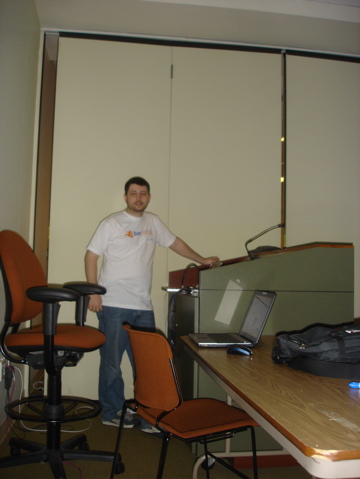
Ben Stucki talking about Flex, via some unholy Windows/Macintosh alliance
Anyways, setup drama aside, Flex seems reasonably interesting. In general, I'm not a big fan of proprietary development solutions that break the model of the web (any content in any browser). But flash is reasonably portable, and it does look like it is super-easy to generate rich applications using Flex. Apparently, this is targeted towards enterprises, and I would much rather see Flex getting adopted than Microsoft's crazy (and super-evil) Avalon stuff.
-Andy.
Technorati Tags: Barcamp, Flex, Adobe, Macromedia, Mac Snob
Barcamp: UNIX / Linux basics
Jordan Sissel (Google) is giving a presentation about UNIX / Linux basics. Since I maybe-possibly-sortof already know UNIX, I'm really just here to help ask questions, and see one way to do an intro-to-UNIX talk.Jordan's talk seemed to really dive right in - he quickly got to navigating around in the shell. I think I would have started with a bit more of UNIX philosophy (which I know, is probably boring), and comparing and contrasting UNIX with Windows.
The UNIX philosophy (in my mind) is:
- Clean separation of components - the Kernel is separate from the windowing system, which is separate from the web browser, which is separate from the web server. In UNIX, you can choose the components that you want to use for each function.
- Keep things simple. The basic idea is to keep commands simple, and chain them together using pipes and files.
- "Everything is a file" - in UNIX, pretty much every resource can be accessed as a file. This file-access semantic makes it possible for different commands to interoperate with each other. Think of it as the common UNIX protocol.
- Supports multiple users by design - since the beginning, UNIX has been designed to support multiple users all sharing the same system. This legacy of supporting multiple users has made UNIX quite secure.
- Clean design - The core design of UNIX has endured for over 30 years, with numerous implementations. But the fact that UNIX remains, is a testament to its elegant design.
-Andy.
Technorati Tags: Barcamp, UNIX
Barcamp San Francisco: Day 2
I really wanted a picture of the Barcamp logo to start things off, but I could find one until last night, on a t-shirt:
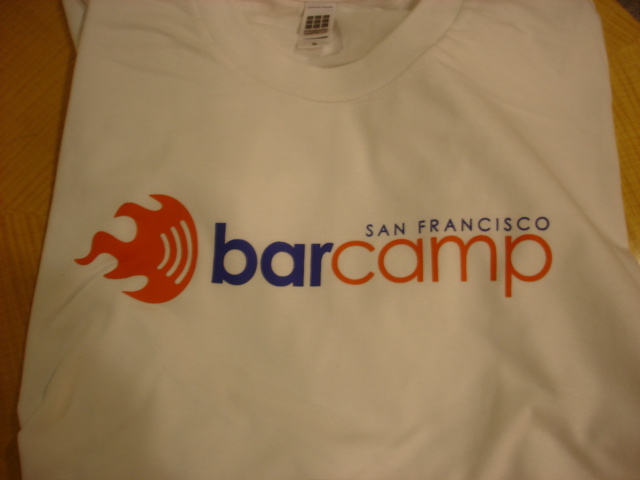
Anyways, I camped out on Microsoft's concrete floor last night (comfy!), and I am ready to go for another day of Barcamp. I think that things wrap-up at around 4 today, at which point I'm sure that I'll be pretty tired. :)
-Andy.
Technorati Tags: Barcamp
June 24, 2006
Webhosting Q&A
Erica Douglas - Simpli hosting - owner of a webhosting company (for last 5 years). Here to answer questions.
Q: Can I use Google WiFi to host my website for free?
A: Yes and no - depends on what ports Google blocks. If not, you can do it, if it is a personal site, etc. Upstream bandwidth will hurt. Some free hosting companies - i.e. addyour.net (free web hosting, pick your subdomain), pbwiki.com (free wiki), wordpress.com (free blogs).
Q: Why host at all?
A: Hosting companies have high (multi gigabit) bandwidth. Reliable power. Cooling. Controlled environment.
Q: What should be the cost for colo with low bandwidth requirements?
A: Depends on size of server (rack space) - space in colo environment costs money. Office space in San Jose costs $1.26 sq/ft. Market post tower (MAE West) - $22 sq/ft. Recommend 1U or 2U case. Can convert typical desktop to this case for one-time fee of $200. Will save a lot of money to convert vs. keeping desktop space.
1U = $35/mo
2U = $60 - 70/mo
desktop = $110/mo
Simpli prices are are 1U + 100Gb for $79/mo.
Q: What does 100Gb of transfer mean per month?
A: Two ways to measure bandwidth - in terms of data/mo, or bandwidth (1Mbit - 95th percentile). Server is connected 100Mbit out to Internet, can burst up to that. For 95th percentile, they measure bandwidth every 5 minutes, chop of the 5% highest usage points, then bill on that. All hosting providers are billed 95th percentile style for the bandwidth that they buy. For gigabytes transferred, on the other hand, the ISP just calculates data transferred per month. ISPs, as a rule of thumb, is that 200GB/mo is 1Mbit of 95th percentile billing.
Q: What if I am pushing a lot of data to my colo server?
A: Read contract carefully, there could be hidden fees. Some will only charge for downstream (upstream gives them peering leverage), others will charge.
VPS - Virtual Private Server. This is a hosting offering that is taking advantage of virtualization, anything from a FreeBSD jail to a Solaris zone, up to Xen or VMWare. This is still fairly expensive, because you need to back each image with real RAM. So, if you give each VM 512Mb of RAM, then hosting 24 customers requires a box with 12Gb of memory (i.e. not cheap).
Q: Is there an objective site that reviews webhosting company?
A: Not really. News.com has reviews (but they take money). Webhostingtalk.com, but it is a form, and not super-awesome. Looks like there is an opening here for somebody to start something. Possibly a wiki?
If you are looking for a cheap jail, try: linode.com, or jvds.com.
-Andy.
Technorati Tags: Barcamp, Webhosting
From "The Wall of Independence"
They have something that they call "The Wall of Independence" here at Barcamp. The idea is that people randomly and independently write things on some large sheets of white paper tacked to the wall near the entrance. So far, there isn't a whole lot there, but this one caught my eye:
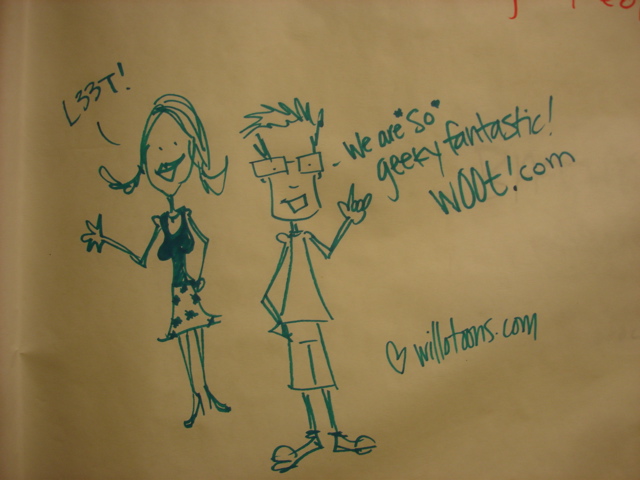
-Andy.
Technorati Tags: Barcamp
Lunch
This Barcamp has been a pretty sweet deal so far. They had a pretty nice spread for lunch, supplied by WilmerHale:
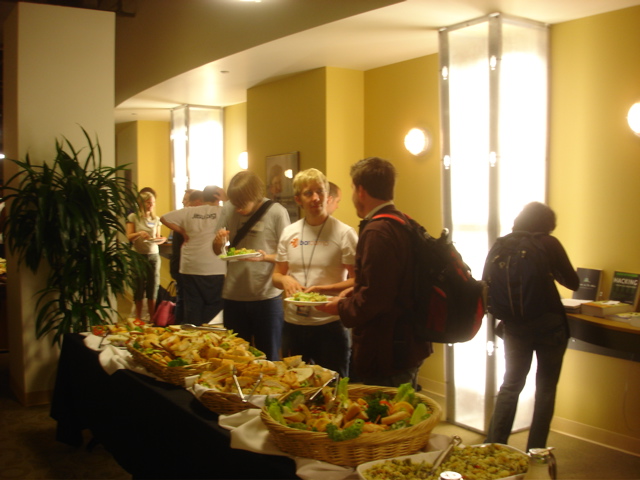
-Andy.
Technorati Tags: Barcamp
Anti Microsoft book at Microsoft?
The Barcamp folks have some free books for volunteers, and I spotted one that I had never heard of before:
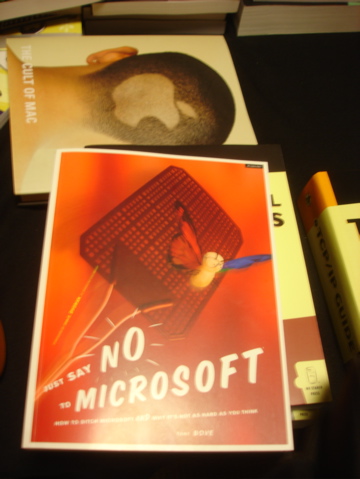
"Just no to Microsoft"
I'm not sure who donated this one, but I thought it was cute.
-Andy.
Technorati Tags: Barcamp
Microformats & Music
I went to the Microformats and Music talk, and took some notes, which are going to evolve in the Wiki. What was interesting to me is that it seems like the hCalendar microformat is getting fairly pervasive, with services like upcoming.org and eventful.com collecting event information and distributing it this way. Thus, the focus of this session was more on how can we get bands and representation and venues using hCalendar, so that their show information can start zipping around the Internet automatically, notifiying me of all of the cool bands that are coming to my town.
This session was pretty small, and also pretty cool. I learned about a bunch of new websites (including pingerati.net), and learned a bit more about microformats - which I have been interested in, but haven't had time to read about.
-Andy.
Technorati Tags: Barcamp, Microformats
Taking a break
When I signed in to Barcamp this morning, I decided to earn some karma points (since I haven't actually been helping with the planning or financing or anything) and sign up to volunteer. So, now I'm manning the greeting table from 1 - 2 pm. Of course, my metal-clad laptop can't get a wireless signal out in Microsoft's lobby, so this is giving me a break from the web to summarize my experience so far.
I guess it is a little bit what I expected, in that the discussions are really hard to blog about. I think I was expecting to be really "blown away" buy a bunch of smart people talking about really smart things. And granted, I haven't been here too long (yet), but so far it has been just a bunch of nice, smart people talking about things. Which is cool.
In the opening intro, the thing that really struck me was when Tantek said "you get out Barcamp of what you put into it". So, as long as I stay social and engaged, I am sure that I'm going to get something great out of this experience.
-Andy.
Technorati Tags: Barcamp
Flex and Ajax
I derailed the Flex and Ajax discussion (organized by Andre from EBA Labs) by moving it into one of my rich web application pet peeves, accessibility. What I learned is that there are some screen readers (Jaws for Windows, apparently), that actually understand enough about Flash and HTML DOM that they can actually navigate into flash and Ajax applications, and read out the contents for the visually impaired.
So, that's good, but I still feel that great strides were made in terms of accessibility with HTML, but a lot of the newer technologies for making the web richer (plugins, Java applets at first, now flash and Ajax) are taking us backwards.
-Andy.
Technorati Tags: Barcamp, Flex, Ajax
At Barcamp today
So, I'm going to be at Barcamp today and tomorrow. I'm just getting oriented - I hope to post more as I do more.
For now, here are some links:
-Andy.
Technorati Tags: Barcamp